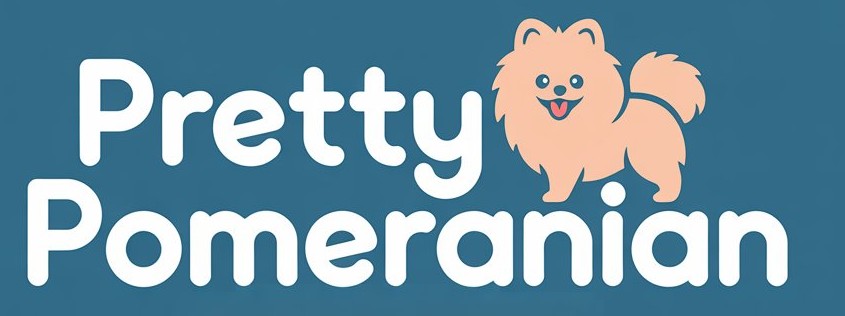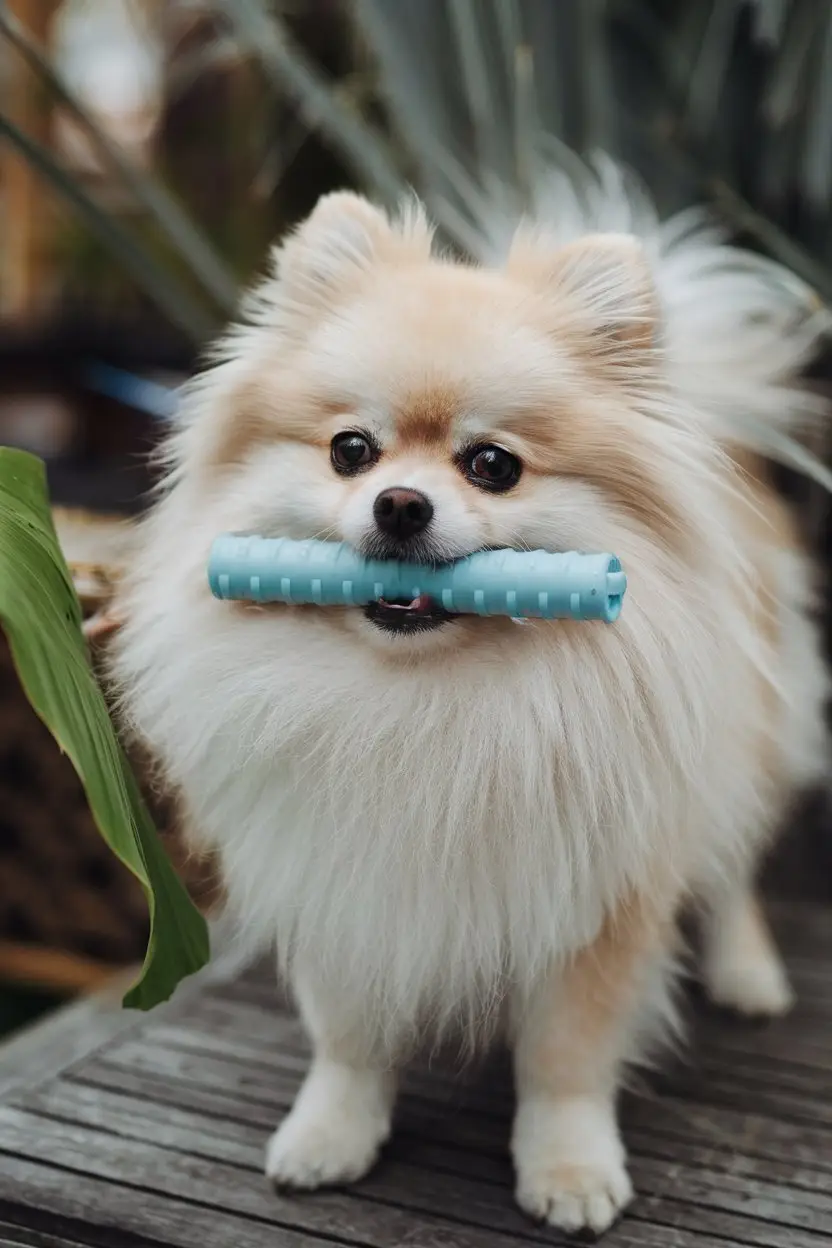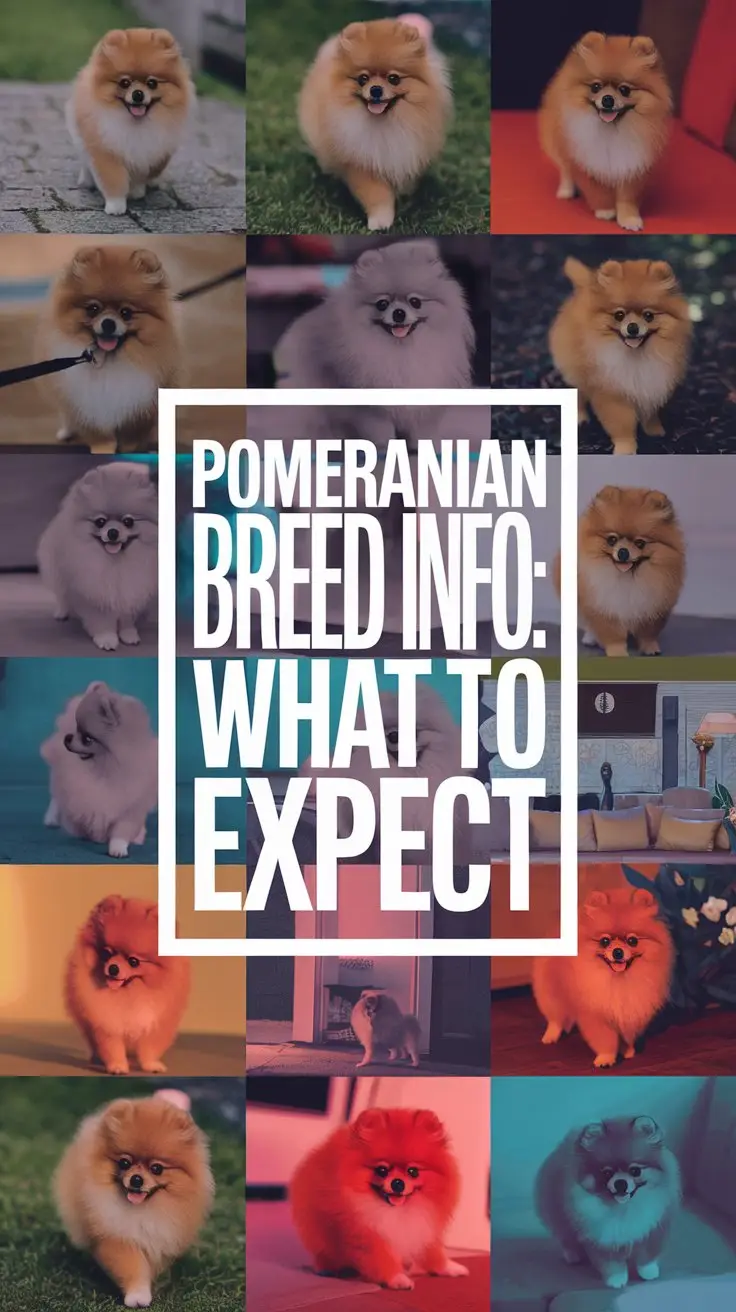Want a tiny, lovable dog with a huge personality? A Pom might be just right for you!
These adorable furballs are smart and pick up tricks fast, bringing tons of fun and excitement to your home. Just keep in mind you'll need to brush them daily, take them on walks, and stay on top of their training to keep them happy.
While they're great family pets, you'll want to watch them around little kids and teach the kids to be gentle.
Before getting a Pom, think about whether you have enough time and space – these little pups love attention and need plenty of playtime and chances to meet other dogs and people.
There's so much to love about these sweet, tiny fluffballs!
What Makes Pomeranians Special
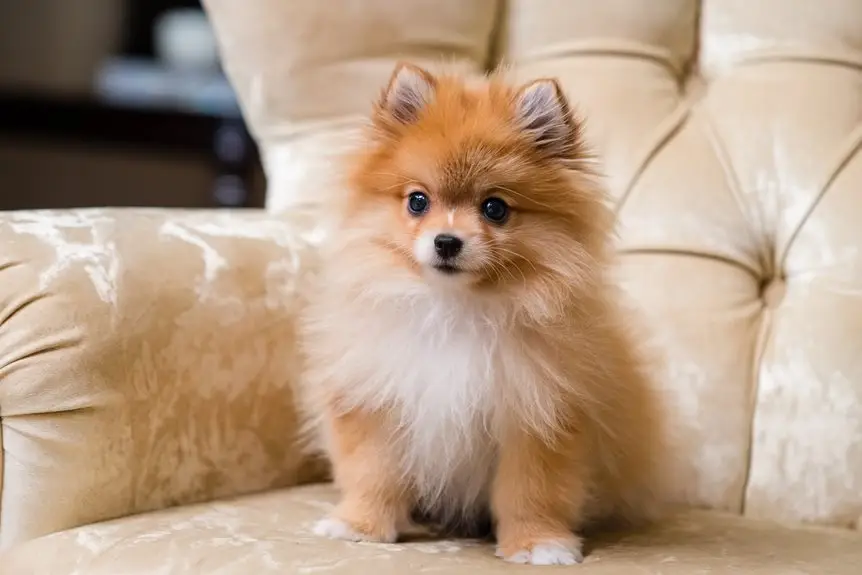
Poms are just the cutest little fluffballs you'll ever meet! These adorable pups pack so much personality into their tiny bodies, it's amazing. They love to goof around with their toys but are also total snuggle bugs who can't wait to curl up with their favorite humans.
Whether you live in a tiny apartment or a big house, these little guys fit right in anywhere. They're super smart cookies when it comes to learning tricks, especially if you've got some yummy treats in your pocket! These friendly furballs get along great with pretty much everyone – from kids to other pets – and they're not shy about showing how much they care. And don't let their tiny size fool you – these little dogs have huge attitudes and the funniest little quirks that'll keep you laughing and smiling all day long! With proper care and attention, these lovable companions can bring joy to your life for up to 16 years.
Living With a Pomeranian
Life with a Pom is all about finding the sweet spot between giving them attention and making sure they're well-behaved. These little fluff balls need regular brushing, exercise, and training to keep them from turning into barking machines or tiny stubborn divas. They're great in apartments, but get ready for lots of potty breaks – their tiny bladders can only hold so much! Having a grooming supply arsenal ready with essential tools like slicker brushes and nail grinders will make maintenance much easier.
- Get into a daily brushing habit to keep the fur from taking over your home
- Make time to play with them a bunch during the day – they've got energy to burn
- Stay on top of training with treats and praise – they're smart cookies!
- Keep them healthy with vet visits and don't forget about those teeth
Sure, they need some work, but these little pups are pretty good at keeping themselves busy with their toys, and they're not too hard to keep clean if you stay on top of it. The best part? They can make themselves at home pretty much anywhere you put them!
Training Your Furry Friend
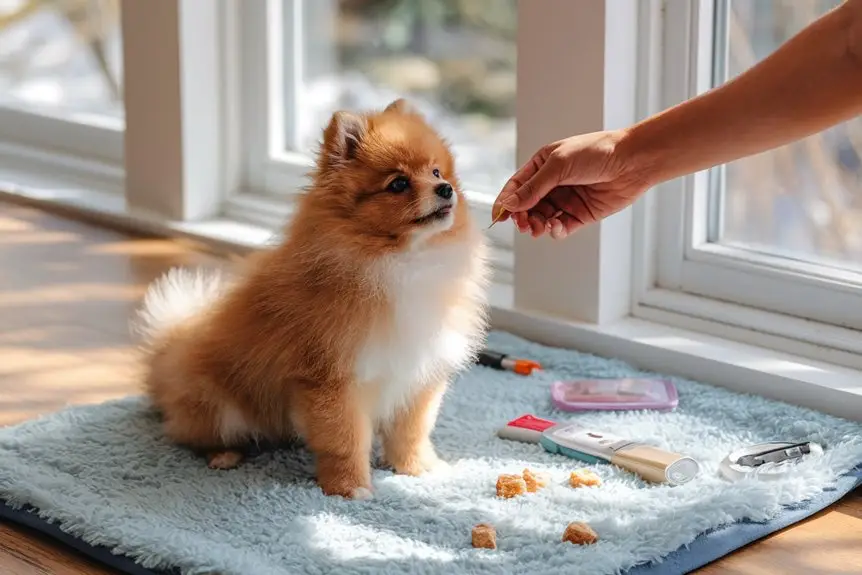
Training your Pom is all about being consistent and using lots of treats! These smart little pups absolutely love their snacks, so they'll pick up new tricks super fast when there's food involved.
You've got to set some ground rules right from the start because these fluffy buddies can get pretty stubborn if you're not clear about what's okay and what's not. Start with the basics, and make sure to work on their barking habits and attention-seeking behavior. Getting them used to other pets and people early on is super important too.
Don't try to make training sessions too long – these little guys have short attention spans! They'll be way more interested in learning when you've got their favorite treats handy, but watch out for overfeeding. Stick with it, and before you know it, your Pom will be the well-behaved little champ you've been hoping for.
Using a positive reinforcement technique will help your Pomeranian learn more effectively and build trust between you and your pet.
Health and Wellness Essentials
Taking care of your Pom's health is just as important as teaching them good habits. Want your furry friend to stick around for 12-16 years? Keep up with vet visits, grooming, and watch their weight. Trust me, it's worth the effort!
- Get those teeth cleaned often – Poms can have nasty dental problems that mess with their health
- Keep an eye on their weight – these little guys shouldn't get chubby or their joints will suffer
- Don't skip the weekly ear cleaning – their ear shape makes them easy targets for infections
- Grab that brush regularly to tackle their thick double coat – it helps avoid tangles and keeps shedding under control while you check their skin
Watch for signs of collapsed trachea in your Pomeranian, which can cause coughing and breathing difficulties that worsen with excess weight.
Grooming Your Pomeranian
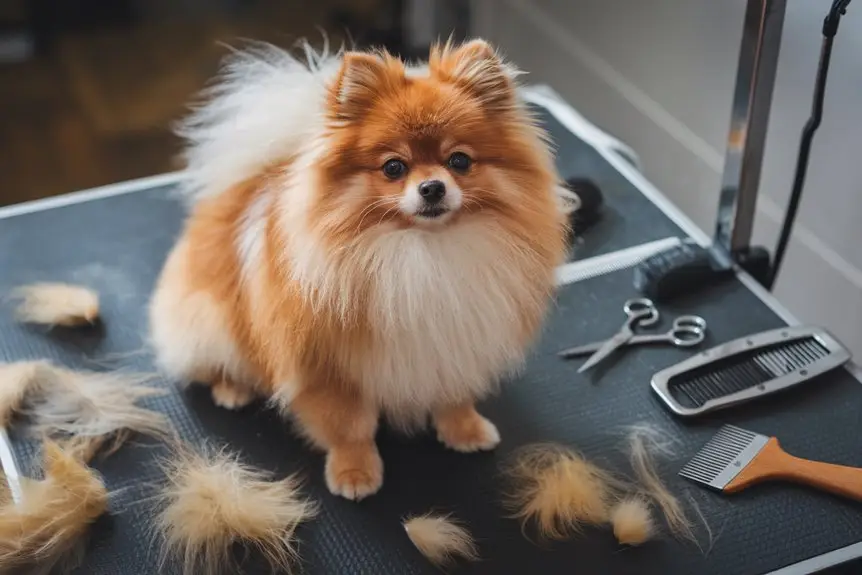
Hey, looking after your Pom's grooming isn't as scary as you might think – you can totally handle it with a good routine! Just grab a brush and give their fluffy double coat some love a few times each week. This keeps those pesky mats away and helps with all that shedding. Plus, when you brush them regularly, it spreads their natural oils around and keeps their fur super healthy (and less stinky!).
Keep an eye on those cute little ears since Poms can get ear problems pretty easily. Give them a quick clean now and then, and if you spot any redness or irritation, that's your cue to check things out. Oh, and don't slack on the teeth – brush them daily to fight off that bad breath and other mouth problems these little fluffballs tend to get. While taking them to a groomer every few months is great for keeping that adorable pom-pom look, you can totally rock most of the grooming stuff at home. Just get some basic tools and stick to it! You'll notice your Pom sheds more during seasonal transitions in spring and fall when they're changing their coats for different weather.
Common Behavior Patterns
Pomeranians have three big personality traits: they're super social butterflies, love checking everything out, and stick to their families like glue. Your Pom will always want to hang out and snoop around, while staying close to their favorite humans. These smart little pups can keep themselves busy, but they'd much rather spend time playing and snuggling with you.
- They can have fun on their own, playing with toys and going on mini adventures smelling stuff around the house
- They're natural tiny guards who'll let you know about visitors or weird noises with their signature bark
- When they want attention, they might get chatty or follow you everywhere like a furry shadow
- They really love treats, which helps with training, but they can be pretty stubborn so you'll need to stay patient and positive
These little furballs can be a handful sometimes, but they're totally worth it – just make sure you give them enough attention and keep up with their training.
Early socialization and training are essential to prevent your Pomeranian from developing aggressive behaviors as they grow older.
Space and Exercise Requirements
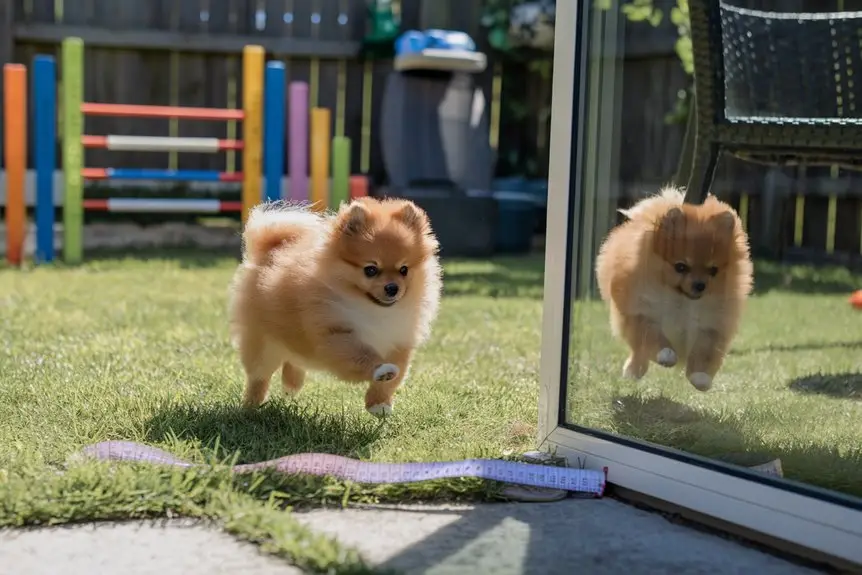
You don't need a huge place to keep a Pomeranian happy – they do great in both apartments and houses. These tiny pups won't hog much room, but make sure they've got enough space to run around and play without getting into trouble.
Don't let their small size fool you – these little fluffballs need their daily workout to stay healthy and well-behaved. Plan on giving them about 20-30 minutes of exercise each day, whether it's walks around the block, playing fetch inside, or letting them zoom around the backyard. They're pretty active pups who love playing with their toys, so you'll want to set aside a spot for their playthings and activities.
Just because they can live in smaller spaces doesn't mean they should be cooped up all day. A Pom that gets plenty of exercise will be way more content, stay healthier, and won't tear up your stuff because they're bored and antsy. Since Pomeranian puppies need 18-20 hours of sleep daily, make sure they have a quiet space to rest between play sessions.
Family Compatibility and Social Nature
Pomeranians really shine as family buddies. While they're super loving, it's important to know they can sometimes be a bit bossy and need proper training around kids. These little furballs usually do well with family life, but they're not always as patient as you might think – especially with younger children who don't know how to handle small dogs.
- Poms can be good with kids, but they need supervision since they might snap if handled roughly
- With proper introductions, they can get along with other pets, though some might be a bit territorial
- Most Poms are pretty outgoing and like meeting new people, but some can be a bit yappy with strangers
- They're smart cookies and love treats, which makes training fun and easier
These little pups love being part of the action and can add tons of personality to your home – just remember they're tiny dogs with big attitudes! They need consistent training and rules to be their best selves in the family setting. Early socialization training is crucial for helping Pomeranians accept and adapt to new dogs and people in their environment.
Frequently Asked Questions
Do Pomeranians Get Along Well With Other Small Exotic Pets Like Hamsters?
Just know that Poms and hamsters can be a tricky mix! These little pups are super sweet, but they can get pretty excited and might see tiny pets as something to chase. It's totally possible for them to be buddies, but you'll want to keep a close eye on them whenever they're near each other – better safe than sorry! Think of your Pom as that energetic friend who doesn't always know their own strength.
Can Pomeranians Safely Travel on Long-Distance Flights in Cabin?
Hey, Poms are great little travel buddies for flying! Since they're tiny (usually under 14 pounds), they can totally go with you in the cabin. They easily squeeze under airplane seats – just make sure you grab an airline-approved carrier and get their health papers sorted out first.
How Do Pomeranians Handle Extreme Weather Conditions, Both Hot and Cold?
Your Pom's thick, fluffy double coat works like a winter jacket, making them pretty good at handling chilly weather. But when it gets super hot outside, these little fluff-balls can really struggle. Better keep those outdoor walks short during scorching days, and make sure they've got a comfy spot to chill with plenty of water, no matter if it's freezing or boiling outside.
Are Pomeranians Good Emotional Support or Therapy Dogs?
Your Pom can be a fantastic buddy for emotional support or therapy because they're total love bugs who adore being close to their humans. These little fluffballs have such friendly, outgoing personalities and really get attached to their people. Plus, they've got this amazing knack for picking up on how you're feeling and snuggling up right when you need some comfort the most.
What Age Is Best to Introduce a Second Pomeranian to the Household?
Getting another Pomeranian works great when your first one is between 1-2 years old. These little fluffs love having friends around, but make sure your first pup has learned their manners and settled into a good routine first.
